Spring 2022 History Symposium: History and Race in the US and Beyond
PANELISTS:
Dr. Joan Flores-Villalobos, University of Southern California
Dr. Ian Shin, University of Michigan
Matthew Randolph, Ph.D. candidate in history, Stanford University
STUDENT PRESENTERS:
Thomas Brodey
Joseph Fattorusso
Ethan Fine
Ilyssa Forman-Roberts
Meenakshi Jani
Jiajia Zhang
Date: Friday, April 29
Time: 3:00p.m. to 5:00 p.m.
Location: Pruyne Lecture Hall (Fayerweather 115, wheelchair accessible)
Open and free to all Amherst College staff, faculty and students.
K-95 masks currently required for all indoor events over 10 participants.
At this panel event, three of our distinguished alumni - professional historians - will comment on the work produced by our students, and place it in the larger framework of discussions in the field
Defining and Redefining Equal Educational Opportunity in America's Urban School Districts
Image
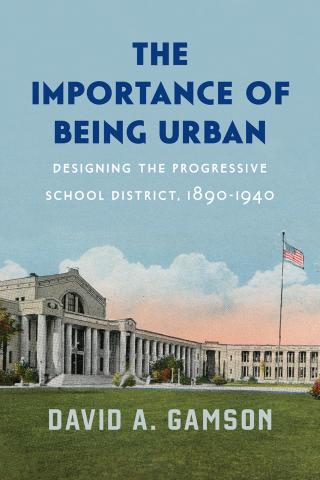
Professor David A. Gamson
Pennsylvania State University

February 18
4:30 p.m.
Paino Lecture Hall (107 Beneski)
Despite the bleak view that many Americans have of our nation’s urban school districts, the Progressive Era city school system was once considered to be among the great democratic creations of the twentieth century. From the 1890s until the Second World War, most prominent educational leaders and policy makers depicted urban schools as laboratories of progressive educational innovation, much in the same way that municipal reformers of the era portrayed cities as experimental stations for novel forms of governance. The enduringly dour view of the American school district—whether accurate or not—masks a fascinating story about the role that school districts have played in the nation’s educational history. Because it offered public education to children from a spectrum of social backgrounds and economic classes, reformers believed that the urban school district held the potential to deliver on the promise of equal educational opportunity by quelling class differences and fostering a tranquil industrial democracy. This talk, adapted from The Importance of Being Urban, looks anew at this Progressive Era institution, exploring why civic leaders, academics, muckraking journalists, educators, and administrators all agreed on the urgency of urban educational reform and why they believed that the newly designed progressive school district was singularly qualified to carry out comprehensive educational improvement.
Read more about Professor Gamson's work here.
Saigon at War

Professor Heather Stur
University of Southern Mississippi
February 19, 2020
4:30 p.m.
Fayerweather 115
Professor Heather Stur will offer a lecture based on her forthcoming book Saigon at War: South Vietnam and the Global 1960s. Stur investigates South Vietnamese political activism during the Vietnam War and focuses on a wide range of actors including South Vietnamese students, Catholics, anticommunists, peace activists, journalists, and diplomats. Her groundbreaking work aims to incorporate South Vietnamese voices, so often overlooked by US historians, more fully into the Vietnam War narrative.
Read more about Professor Stur's work here.
The Ghosts of Sheridan Circle: How a Washington Assassination Brought Pinochet’s Terror State to Justice

Professor Alan McPherson
Temple University
March 23, 2020
4:30 p.m.
Fayerweather 115
Professor McPherson's lecture is based on his new book about the 1976 car bombing of Chilean exile Orlando Letelier and his US colleague, Ronni Moffitt, in the heart of the US capital. The crime sparked an international investigation, a diplomatic impasse, and several courtroom dramas, all shaping one of the most consequential political thrillers of our time. The Letelier assassination changed the history of human rights, democracy and counterterrorism, and helped end Chile’s murderous dictatorship.
History Lectures & Events before 2019
Manual for Survival: a Chernobyl guide to the future
Kate Brown
Thursday, December 6
4 p.m.
Kirkpatrick Hall (Science Center room A011)
Governments and journalists tell us that though Chernobyl was “the worst nuclear disaster in history,” a reassuringly small number of people died (44), and nature recovered. Yet, drawing on a decade of fine-grained archival research and interviews in Ukraine, Russia, and Belarus, this talk uncovers a much more disturbing story—one in which radioactive isotypes caused hundreds of thousands of casualties. Scores of Soviet scientists, bureaucrats, and civilians documented stunning increases in cases of birth defects, child mortality, cancers, and a multitude of prosaic diseases, which they linked to Chernobyl. Worried that this evidence would blow the lid on the effects of massive radiation release from weapons testing during the Cold War, international scientists and diplomats tried to bury or discredit it. A haunting revelation of how political exigencies shape responses to disaster, Manual for Survival makes clear the irreversible impact on every living thing not just from Chernobyl, but from eight decades of radiation from nuclear energy and weaponry.
Kate Brown is a Professor of History at the University of Maryland, Baltimore County. She is the author of A Biography of No Place: From Ethnic Borderland to Soviet Heartland (Harvard 2004); Plutopia: Nuclear Families in Atomic Cities and the Great Soviet and American Plutonium Disasters (Oxford, 2013); Dispatches from Dystopia: Histories of Places Not Yet Forgotten (Chicago, 2015); andManual of Survival: A Chernobyl Guide to the Future (Norton, 2019). Her work has received numerous prizes and awards, including from the American Society for Environmental History, the Organization of American Historians, and the American Historical Association. In 2016, she received the prestigious Carnegie Foundation Fellowship.
Global Rise of Nativism and Illiberalism
Tuesday, November 27
4:30-6:30 p.m.
Frost Library, 210
Panelists:
- Tamir Bar-On, Monterrey Institute of Technology and Higher Education
- Chip Berlet, Boston
- Dwaipayan Sen, Amherst College
- Maria Sidorkina, Amherst College
Discussant:
- Andreas Önnerfors, University of Gothenburg, Sweden/STINT-fellow at Amherst College
In the contemporary political pathology, two phenomena appear currently intertwined, exclusionary nativist beliefs and electoral preferences for illiberal styles of politics. Do we witness a global return to a longing for closed ethnic communities and authoritarian rulers, promising security in an age of perceived systematic crises? Whereas the rapid rise of the populist radical right in Europe as much as in the US is an evident starting point, the aim of the panel is also to open up the conversation to a larger outlook. How can we explain these global reactions upon geopolitical developments as much as the globalization of uncertainty? These issues will be addressed by the four panelists followed by a discussion in plenum.
Dr. Tamir Bar-On is one of world’s leading experts on the French and European New Right. He is a professor in the School of Social Sciences and Government, Tecnológico de Monterrey in Queretaro, Mexico.
Chip Berlet is a Boston-based American investigative journalist, research analyst, photojournalist, scholar and activist, specializing in the study of extreme right-wing movements in the US and the dissemination of conspiracy theories.
Dr. Dwaipayan Sen is an expert on the history of caste policy and postcolonial democratization in India. He is an Assistant Professor of Asian Languages and Civilizations and History at Amherst College.
Dr. Maria Alexandrovna Sidorkina is a postdoctoral fellow at the Centre for Humanistic Inquiry at Amherst College. Her research concerns illiberal publics and politics in post-socialist space, linguistic anthropology and digital sociability.
Dr. Andreas Önnerfors is Associate Professor in Intellectual History at the University of Gothenburg, Sweden, currently specializing in contemporary European New Right populist rhetoric.
How Fermi Became Fermi
David N. Schwartz
Monday, February 5
4:30 p.m.
Paino Lecture Hall, Beneski
Enrico Fermi was one of the most significant figures of 20th century physics, with major contributions across a wide range of sub-disciplines. He was also a central figure in the Manhattan Project, and led the team that created the first controlled, sustained nuclear chain reaction at the University of Chicago in December 1942. How did Fermi become Fermi? Drawing on research undertaken in preparation for his new biography of Fermi, “The Last Man Who Knew Everything: The Life and Times of
Enrico Fermi, Father of the Nuclear Age” (Basic Books), David N. Schwartz will discuss the development of Fermi as a physicist; the role of nature, nurture, and historical circumstance in his career; and the characteristics behind both his strengths and his weaknesses. Are great physicists born, do they make themselves, or do others make them? How does the accident of one’s birth influence a career like Fermi’s? What was it that enabled Fermi to continue to contribute to the field well beyond the age when many great physicists are content to rest on their previous achievements?
David N. Schwartz holds a B.A. from Stanford University and a Ph.D. from the Massachusetts Institute of Technology. He has worked at the US Department of State, the Brookings Institution, and Goldman Sachs in both London and New York. He has published widely on US strategic nuclear weapons policy, NATO, and foreign policy. He lives in New York with his wife Susan. His father, Melvin Schwartz, shared the 1988 Nobel Prize in Physics for the discovery of the muon neutrino.

The "Dialectic of Enlightenment"
Steven E. Aschheim
Tuesday, January 30
6:00 p.m.
Pruyne Lecture Hall, Fayerweather
Intellectual and cultural historian Steven E. Aschheim (Hebrew University, Jerusalem) is the author of Brothers and Strangers: The East European Jew in German and German Jewish Consciousness, 1800-1923 (1982), The Nietzsche Legacy in Germany 1890-1990(1993), Culture and Catastrophe: German and Jewish Confrontations With National Socialism and Other Crises (1996), In Times of Crisis: Essays on European Culture, Germans, and Jews (2000), Scholem, Arendt, Klemperer: Intimate Chronicles in Turbulent Times(2001), Beyond the Border: The German-Jewish Legacy Abroad (2007), and At the Edges of Liberalism: Junctions of European, German, and Jewish History (2012).
In his lecture, The Dialectic of Enlightenment Revisited, Aschheim will critically interrogate Adorno and Horkheimer's 1944 much admired "Dialectic of Enlightenment", addressing its contextual and ideological origins, its philosophical biases and theoretical assumptions, and the nature of its emphases and omissions as the work sought to grasp the barbarism of the time. He will also highlight a rather overlooked publication detail which ideally should have given the authors pause to somewhat revise their provocative views and positions, but in practice did not.
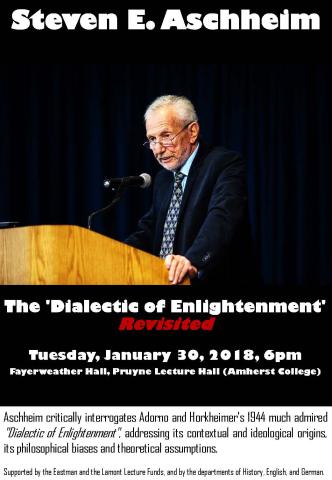
15th Annual Hugh Hawkins Lecture: Craig Steven Wilder
“The Approaching Past: Legacies of Slavery and Conquest on Campus”

Craig Steven Wilder
Barton L Weller Professor of History
Massachusetts Institute of Technology
Thursday, October 5
4:30 p.m.
Paino Lecture Hall
107 Beneski
Professor Wilder will be speaking to contemporary efforts of colleges and universities to confront historical relationships to slavery and colonialism. His most recent book is the award-winning Ebony & Ivy: Race, Slavery, and the Troubled History of America’s Universities (New York: Bloomsbury, 2013). He is also the author A Covenant with Color: Race and Social Power in Brooklyn (New York: Columbia University Press, 2000/2001) and In the Company of Black Men: The African Influence on African American Culture in New York City (New York: New York University Press, 2001/2004). His talk will examine how we arrived at this moment and how to address the challenges that remain. (MIT’s full profile).
The annual Hugh Hawkins Lecture honors Hugh D. Hawkins. Professor Hawkins was the Anson D. Moore Professor of History and American Studies upon his retirement from the faculty in 2000 after forty-three years of teaching at Amherst. He was a distinguished scholar of American higher education, the American South, and of cultural and intellectual history. In 1976 he was the principal architect of the first-year introduction to Liberal Studies curriculum and he helped build both the History and American Studies departments.
This lecture is free and open to the public.
Event Flyer:
Halsted Lounge Celebration & Fall Majors Meeting
Thursday, September 15
Halsted Lounge Celebration (Chapin 19): 3:00 – 4:00 p.m.
Fall Majors Meeting (Chapin 101): 4:00 – 5:00 p.m.
Thursday, September 15th brings History's Fall Majors meeting, where we review major requirements and department deadlines. Prior to the meeting, however, we'd like to invite everyone to celebrate our newly renovated Halsted Lounge, Chapin 19. In consultation with History alums Becky Konijnenberg '16 and Matt Randolph '16, the History department has renovated the lounge to make it a much friendlier study and social space for our majors. Please come celebrate (and eat) with us!
RECEPTION: Steven Simon
Wednesday, September 21
4:30 p.m.
Center for Humanistic Inquiry (CHI), Frost Libary
Steven Simon is John J. McCloy ’16 Visiting Professor of History at Amherst College. Professor Simon has held a variety of positions in the U.S. State Department and in academe as a Middle Eastern policy advisor, consultant, and scholar; he is also widely published as both national commentator and book author. He is a former director of the U.S. and Middle East offices of the International Institute for Strategic Studies and a former senior director for Middle Eastern and North African Affairs on the White House’s National Security Council. He is currently working on a new book, entitled The Long Goodbye: The U.S. and Middle East from the Islamic Revolution to the Arab Spring. The History Department is delighted to welcome Steven Simon to Amherst.
14th Annual Hugh Hawkins Lecture: Arne Westad
“Worlds Apart: The Cold War in the 20th Century”
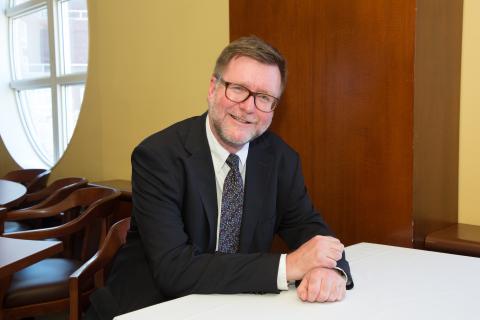
Arne Westad
S.T. Lee Professor of U.S.-Asia Relations
Ash Center for Democratic Governance and Innovation
John F. Kennedy School of Government
Harvard University
Thursday, September 29, 2016
4:30 p.m.
Paino Lecture Hall (107 Beneski Hall)
The Department of History is delighted to welcome Professor Arne Westad to Amherst for our 14th annual Hugh Hawkins lecture. Professor Westad "won the Bancroft Prize for The Global Cold War: Third World Interventions and the Making of Our Times. The book, which has been translated into fifteen languages, also won a number of other awards. Westad served as general editor for the three-volume Cambridge History of the Cold War and is the author of the Penguin History of the World (now in its 6th edition). His most recent book, Restless Empire: China and the World since 1750, won the Asia Society’s book award for 2013" (Harvard profile).
Abstract: The Cold War dominated world affairs for almost half a century. But its roots go even further back in time and its effects are still felt today. In this lecture, I will discuss my new book on the Cold War, which tells the history of the global conflict from its inception up to the present. It starts with the first worldwide economic crises, the radicalization of the labor movement, and the expansion of the United States and Russia as transcontinental great powers. And its ends with the fall of the Berlin Wall, the collapse of the Soviet Union, and the multiple ways in which the Cold War determined American policy in the 21st century.
The Cold War was uniquely comprehensive, both because it was a total war (though without direct clashes between the Superpowers) and because of its global reach. People everywhere felt they were affected by it. From the slums of Soweto to Hollywood, Hanoi, and Hamburg, young men and women found causes for which they were willing to offer their careers and livelihoods, and sometimes their lives. And the combined intensity of resilient ideologies and nuclear threats created opposing worlds, which operated according to different logics, but were still connected by the fear of war and destruction.
The new book is not just a history of ideological conflict and great power rise and fall. It is also an account of how the Cold War influenced people’s lives and how the conflict created opportunities for some, but death and misery for others. It ranges wide in terms of research, from Germany to Brazil to China and to South Africa, and shows how people’s dreams of one world united helped drive groups and countries apart – how the search for utopia created ceaseless conflict and merciless leaders.
The annual Hugh Hawkins Lecture honors Hugh D. Hawkins. Professor Hawkins was the Anson D. Moore Professor of History and American Studies upon his retirement from the faculty in 2000 after forty-three years of teaching at Amherst. He was a distinguished scholar of American higher education, the American South, and of cultural and intellectual history. In 1976 he was the principal architect of the first-year introduction to Liberal Studies curriculum and he helped build both the History and American Studies departments.
Event Flyer:
The Black Experience at Amherst: A Special Topics Presentation
Tuesday, May 3rd – 4:00 p.m.
Multicultural Resource Center (MRC)
What does it mean to be black at Amherst College? Which students identify (or do not identify) as black? What about the black experience at a progressively more diverse Amherst College has changed (or not changed) over time? To what extent have administrative initiatives to promote and celebrate campus diversity succeeded in practically manifesting their promises? Above all, how have students of African descent shaped and been shaped by the character and history of the College?
Curious about these kinds of questions? Uncovering the past has become increasingly critical for Amherst as we approach the College's bicentennial in 2021 and attempt to understand who we were and who we want to be as a community. Come to the Multicultural Resource Center at 4:00pm on 05/03/16 to learn about four seniors' explorations for a special topics course on the history of the black experience at Amherst College with Professors Polk and Couvares. Short presentations will be given by Matt Randolph '16, Amira Lundy-Harris '16, Darienne Madlala '16, and Ajanae Bennett '16. Each presentation will be followed by a Q & A session, with a final dialogue between guests and presenters about future investigation into the topic of black identity at Amherst.
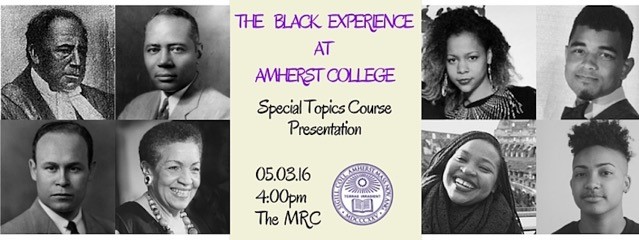
Benjamin Madley
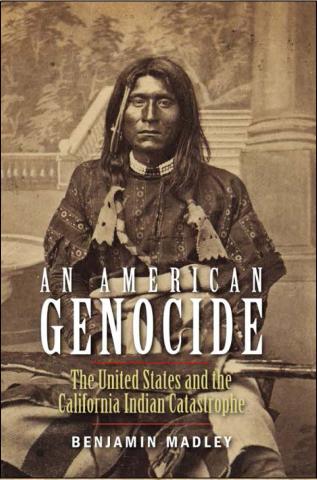
Benjamin Madley, Assistant Professor of History, University of California, Los Angeles
Friday, April 29, 2016
4:00 p.m.
Friendly Reading Room, Frost Library
On Friday, April 29th at 4:00 PM in the Friendly Reading Room of Frost Library (Amherst College), Professor Benjamin Madley from UCLA will be talking about his new book, An American Genocide The California Indian Catastrophe (Yale University Press, 2016). Ben's book is a groundbreaking account of an understudied tragedy in U.S. history. As historian Karl Jacoby (Columbia University) has remarked, “Benjamin Madley has changed the conversation on genocide and American Indians. After An American Genocide, it will no longer be possible to debate whether or not genocide took place. Instead, we will need to confront the questions of how and why genocide against American Indians took place and what the United States owes its indigenous communities.”